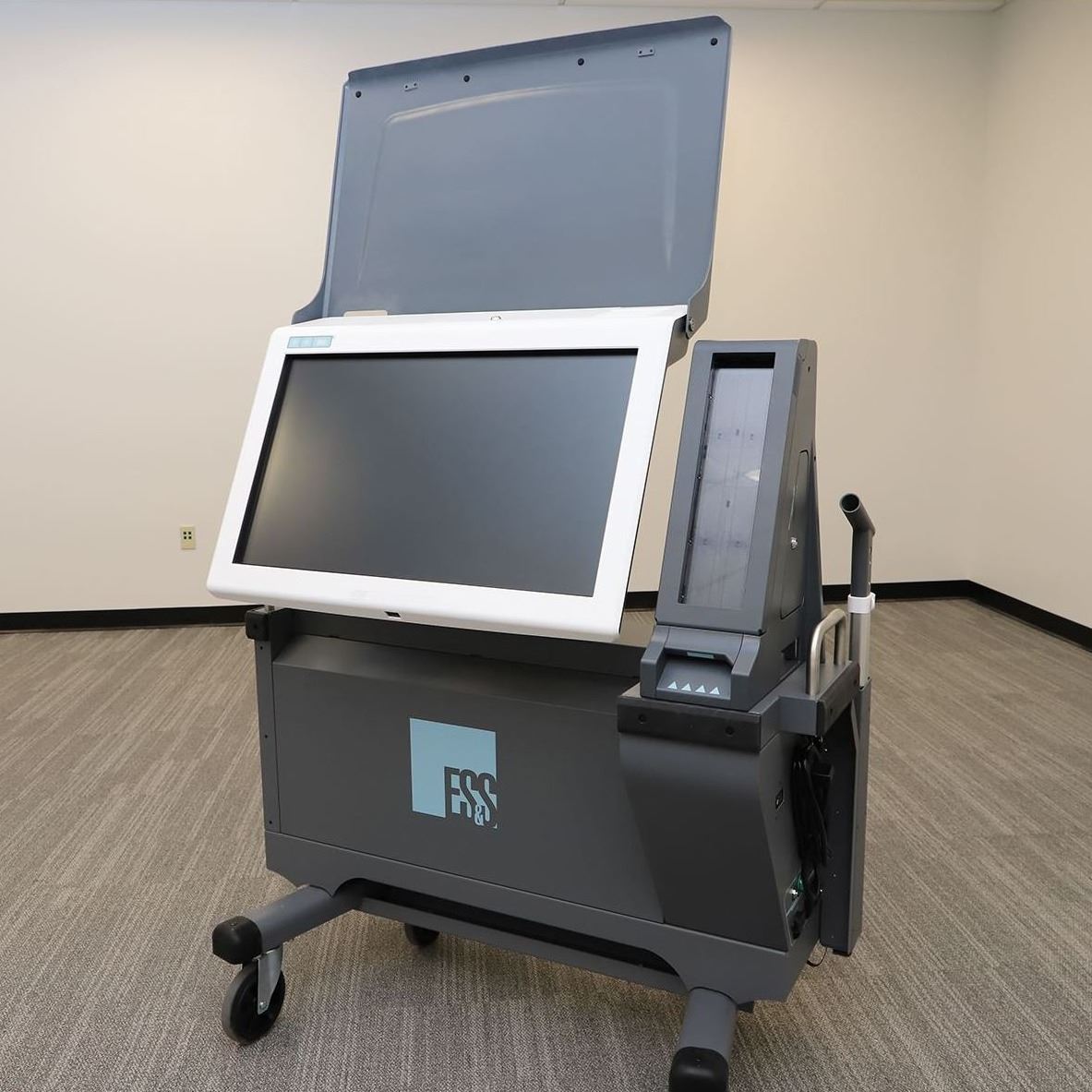
This article is a part of Every Voice, Every Vote, a collaborative project managed by the Lenfest Institute for Journalism with lead support from the William Penn Foundation, and additional funding from Lenfest, Comcast NBC Universal, the John S. and James L. Knight Foundation, Henry L. Kimelman Family Foundation, Judy and Peter Leone, Arctos Foundation, Wyncote Foundation, 25th Century Foundation and Dolfinger-McMahon Foundation.
When Philadelphia resident Steven Feldman started working the polls in 2017, voter technology hadn’t been updated in decades.
Voting machines looked like they were from the 1980s, according to Feldman, who is a judge of election, aka a head poll worker. Things are different now. Updates have made voting in Philadelphia much more tech-savvy.
At Feldman’s Point Breeze polling place and across Philly, voters make their choices on 32-inch touchscreens that electronically record selections and pollworkers use a digital tool to search for residents. The modern tech and electronic poll books do make the process more streamlined, he said, at least when people know how to use the equipment.
“The new system is overwhelmingly positive,” Feldman told Technical.ly. “The experience for the voter looks smoother, more reliable, more accurate. With pollworkers that are comfortable using the materials, those folks are able to quickly process a busy crowd.”
Feldman often gets feedback from voters that the newer machines are simpler to use than expected. And the electronic poll books, implemented last year, are generally considered a success.
“We had great feedback from the pollworkers on how easy it was to set up and use the electronic poll books,” said Philadelphia City Commissioner Seth Bluestein. “I was surprised … because pollworkers, on average, are a little bit older than the rest of the population.”
However, some older pollworkers did drop out after the tech upgrades.
“I lost several good people, personally, that worked for me in my voting location,” said Bob Stewart, a judge of election in Northeast Philly. “It’s just intimidating for older people.”
Since then, Stewart has been able to convince some of these workers to come back and learn how to use the new technology, he said, noting that the city runs training programs to help.
Even with that training, Feldman said he often has to answer questions from fellow pollworkers about details that were only briefly mentioned in the training or pollworker manuals. He suggests additional training for workers who had trouble keeping up, and demo machines for voters to practice on year-round.
“The technology does require additional training, and that training should be mindful of the pollworker population that it has to work with,” he said. “The rate of pickup is slower for many of the pollworkers.”
And the voting machines themselves have faced some technical issues.
Making sure there’s a paper trail, despite paper jams
Major upgrades began five years ago when Philadelphia rolled out thousands of new voting machines as part of a statewide initiative to replace them with more modern models.
The statewide initiative was prompted by the US Department of Homeland Security asking all states in 2018 to ensure their voting machines could produce a paper record of votes that could be audited. Pennsylvania replaced all of its voting machines by the 2020 primary election.
Philadelphia had direct recording electronic (DRE) voting machines before 2018, which had an older type of touchscreen, according to Stewart.
At the end of Election Day, one of the pollworkers would press a button to close the polls and the machine would print a receipt with a record of the day’s voting activity.
Most of the seniors were comfortable with those machines, said Feldman, the Point Breeze judge of elections, but they often had mechanical issues such as printer jams and stuck hinges. Sometimes they had to call in a commissioner’s technician to fix the problems, complicating the process.
Independent analyses further documented the issues. The Brennan Center for Justice found DRE machines could have issues with the touchscreens selecting the wrong candidates and not producing a paper ballot for each vote cast was a risk that could threaten the reliability of audits.
In 2019, along with 38 out of 67 other Pennsylvania counties, Philadelphia upgraded to ExpressVote XL machines, which have the kind of responsive touchscreens that’ve become deeply ingrained into everyday life.
“It sort of resembles a tablet,” Feldman said. “Being able to see in crisp, backlit detail the entire ballot, as well as bring up additional information and then have the selections be pretty intuitive or similar to phone use is a nice change.”
Each voting location also has machine inspectors, specially trained pollworkers who help voters use the machines.
When they go into the booth to record their choices, each voter inserts a paper slip that will keep a hard copy version of their casted ballot. The machine shows the voter a preview of what the paper ballot will look like so voters can double-check its accuracy.
Paper jams do still happen, Steward said — it’s the most common challenge he sees with these machines.
Still, the most up-to-date systems had room to improve
When the ExpressVoteXL machines were first implemented during the 2019 election, they faced scrutiny for technical difficulties.
Northampton County, on the eastern side of the commonwealth, reported that the touchscreens weren’t working properly, causing miscounted vote tallies, and Philadelphia saw paper voting receipts getting jammed and equipment panels randomly opening, Reuters reported at the time.

ExpressVote XL manufacturer Election Systems and Software (ES&S) looked into those issues and attributed them to human error, according to Katina Granger, senior manager of public relations for ES&S.
“We can affirm that these issues have not occurred again — as proven during use in subsequent elections,” Granger said. “There have been no reported widespread errors experienced by the use of this technology.”
All ES&S customers in Pennsylvania also upgraded to newer versions of the software, she said. The company established additional quality control steps internally with help from federal agencies and made recommendations for additional steps users could take during logic and accuracy testing procedures.
The Pennsylvania Department of State reviewed these issues with individual counties and the voting system vendor to determine the root cause of the problem and fix it, said Ellen Lyon, deputy communications director for the Department of State. Plus, all voting systems in the state must be certified by both the federal Election Assistance Commission and the Department of State, assuring an extra set of eyes.







